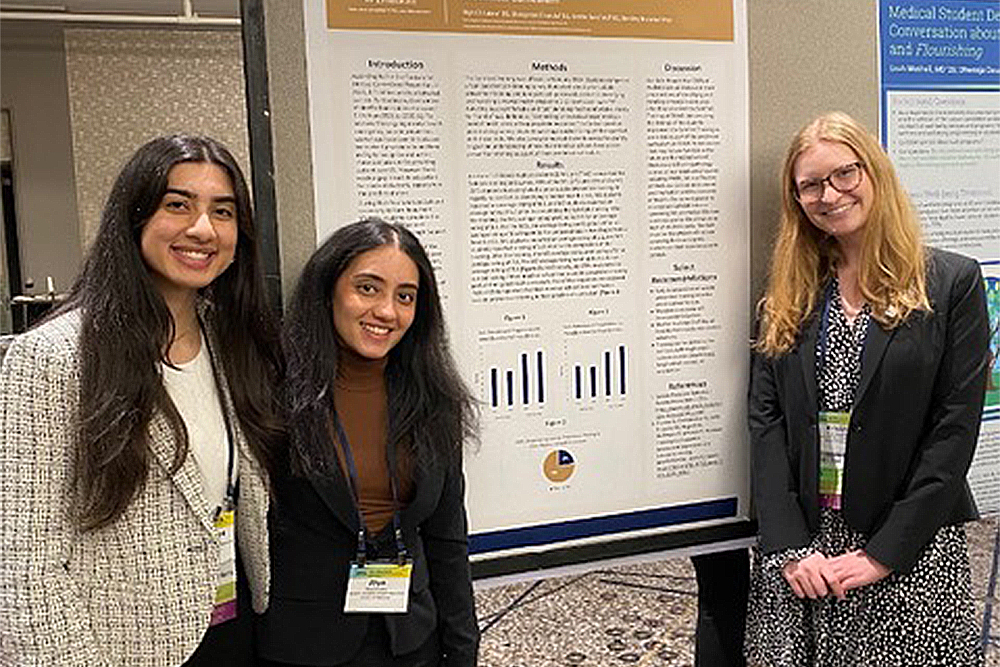
Starting with the Class of 2028, matriculating students at Oakland University William Beaumont School of Medicine will receive special training during orientation that is specific to suicide awareness.
Called safeTALK, the four-hour training is designed to equip people to be more alert to someone thinking of suicide and better able to connect them with further help. Officials said it will help the future physicians when working with patients — and each other.
Training will be delivered by members of the spiritual care team at Corewell Health William Beaumont University Hospital in Royal Oak.
SafeTALK training sessions have been held at OUWB previously, but making the training mandatory is new, said Berkley Browne, Ph.D., associate dean, Student Affairs.
“As aspiring physicians, it’s important for our students to get exposure to having what can be a really uncomfortable conversation early on,” she said.
“Not only for their future patients but for themselves and each other as a class community.”
SafeTALK is a special training program created by Calgary-based LivingWorks.
According to its website, safeTALK helps trainees “learn how to reach out to someone thinking about suicide and help them keep safe by promptly connecting them to further support.”
Training sessions include presentations, facilitated discussion, and skills practice; videos that illustrate what happens when signs of suicide are overlooked, and how trainees can contribute to safe outcomes when these signs are heard and addressed; opportunities to further explore organizational applications of the training, and more. (Sessions always include a second trainer, too, in case trainees need additional support.)
“One thing we’ve learned from doing these sessions is that suicide has touched everyone’s life in some way, shape, or form,” said Bridget Theodoroff, a chaplain at Corewell Health and co-trainer, safeTALK.
“Having these workshops expands the toolkits that health care providers have and that’s important because we’re not only people who are at work or school, but live in communities,” she said. “Having a broader set of skills can help build safer communities.”
According to the Centers for Disease Control and Prevention, in 2021, someone died by suicide every 11 minutes in the U.S.
Yet some believe that medical schools haven’t done enough to prepare students on the topic.
A January column in The Washington Post drew recent attention to the issue.
“Medical students often ill-equipped to help suicidal patients” was written by a trio of faculty from Florida International University.
“Because of the stigma surrounding suicide, medical schools do not equip up-and-coming doctors with the language, comfort and skills needed to recognize it and properly address it with their patients,” wrote the authors.
But OUWB is doing something about it, according to Ven. Kevin Hickey, spiritual care manager, Corewell Health William Beaumont University Hospital, and manager, Clinical Ethics, Corewell Health East.
First, he said, the topic of suicide is incorporated into the school’s Medical Humanities and Clinical Bioethics (MHCB) curriculum. It’s also a part of the school’s Promoting Reflection and Individual Growth through Support and Mentoring (PRISM) longitudinal course.
However, OUWB officials and students wanted to go further, said Hickey, which is where safeTALK comes into play.
According to Hickey, Browne and Ann Voorheis-Sargent, Ph.D., director, Center for Excellence in Medical Education, caught wind of the safeTALK training his team was doing for health care providers at Corewell in Royal Oak.
That coincided with an idea brought forth by Riya Chhabra, rising M3, and a member of the AAMC Organization of Student Representatives. The idea was to offer mental health training in the same way medical students practice CPR or first aid.
Working with Hickey, Browne, Voorheis-Sargent, and Chhabra developed a plan to offer OUWB medical students voluntary safeTALK training sessions.
OUWB medical students showed up — and the program has proven effective.
| More from OUWB |
Virtual healing spaces at OUWB offer opportunities for reflection, calmness OUWB Student Mental Health Counselors to medical students: ‘It’s OK to ask for help’ |
Chhabra, Browne, Shivapriya Chandu, rising M2, and Kristen Sarsfield, rising M4, co-authored a research poster called “Integration of Mental Health First Aid Training into the Preclinical Curriculum.” (The poster was presented at the AAMC Group on Student Affairs Conference in April.)
“Our data showed that 100% of students saw an increase in their preparedness of identifying and handling a mental health crisis after they attended the safeTALK training at OUWB,” wrote the authors.
With the early success of the program, the decision was made to create a way for every OUWB student to receive training.
“Going forward, every incoming class will have this as part of their mandatory curriculum,” said Browne.
Those familiar with the program applaud the move.
“The support for this program has been amazing,” said Chhabra. “Every time we’ve brought forth an idea, OUWB administration has been open and receptive. They’ve been doing their best to make it work and fit it into orientation. We are so grateful, and I feel very supported.”
Hickey shared similar feelings.
“We’re just thrilled and ecstatic about it,” he said. “OUWB administration and leadership are really attuned to and invested in the well-being and health of the OUWB community, which is fantastic.”
“I don’t know of any other medical school that currently has this training as part of their orientation curriculum,” he added.
If you or someone you know is considering suicide, please call or text 988 for confidential, free support.
A safeTALK session is scheduled for July 24, 1-4 p.m., in 110 O’Dowd Hall. It’s open to the OUWB community. Register here.
For more information, contact Andrew Dietderich, senior marketing specialist, OUWB, at [email protected].
To request an interview, visit the OUWB Communications & Marketing webpage.
This work is licensed under a Creative Commons Attribution-NonCommercial 4.0 International License.

